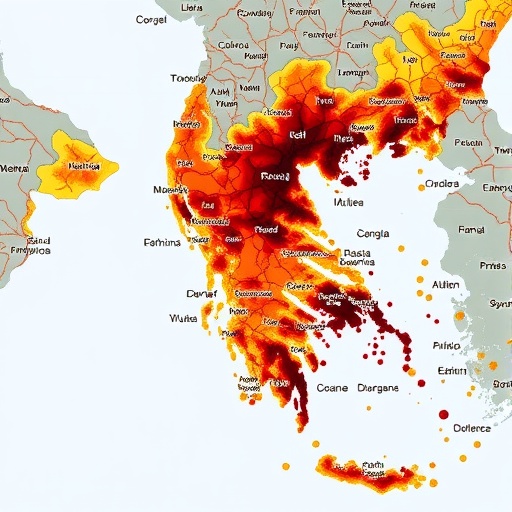In a groundbreaking study that bridges the gap between genetics and complex disease understanding, researchers have unveiled a cutting-edge approach to fine-mapping multiple sclerosis (MS)-associated single nucleotide polymorphisms (SNPs) in Sardinian trios. This research, meticulously conducted by a team led by Baldrighi and colleagues, employs an innovative knockoff-based method to pinpoint genetic variations that could illuminate the pathophysiology of MS, a debilitating autoimmune disorder characterized by neurodegeneration and inflammation in the central nervous system. The implications of this study extend far beyond the island of Sardinia, presenting potential insights into MS mechanisms and therapeutic targets not only for Sardinians but for populations worldwide.
Multiple sclerosis manifests in diverse symptoms due to varying degrees of neurological damage, making its genetic underpinnings an area of intense investigation. Identifying specific SNPs that correlate with MS manifestations forms a critical step in understanding individual susceptibility to the illness. Within this framework, the knockoff-based fine mapping technique emerges as an innovative solution to discern true genetic signals amidst noise, significantly enhancing the accuracy of risk stratification in MS.
The researchers meticulously selected a cohort of Sardinian trios—comprised of parents and their diagnosed children—which adds a unique genetic layer to their investigation. Sardinia’s isolated population provides an opportunity to study genetic components that may be less influenced by environmental factors than in more heterogeneous populations. The intricacies of the SNPs identified through this approach could reveal not only the heritable components of MS risk but also the multifaceted interactions between those genetic variables.
Using knockoff filtering, the researchers cleverly generated synthetic versions of the observed genetic data to control for false discovery rates common in genome-wide association studies. This method effectively enhances the robustness of results, allowing for reliable identification of SNPs that are genuinely associated with MS while minimizing the potential pitfalls of spurious links. By leveraging this sophisticated statistical framework, the findings present a compelling argument for the significance of the selected SNPs.
The knockoff approach also allows for exploration beyond mere association; it opens the door to understanding the mechanistic pathways influenced by these SNPs. By fine-mapping the identified genetic variants, the team aims to elucidate how these changes in the genome may lead to dysregulation of immune responses or alteration in neuronal function, both of which are critical in the context of MS pathology. The exploration of these pathways provides fundamental insights that could steer future investigations into targeted therapies aimed at mitigating the effects of MS.
In examining the Sardinian trios, the authors of the study have not only strengthened the genetic association of MS but have also highlighted the importance of considering population-specific factors when investigating complex traits. This tailored approach recognizes that genetics can behave differently across populations, and understanding these nuances is essential for developing effective interventions.
Moreover, the implications of this work transcend academic circles and invite the pharmaceutical industry to consider new avenues for drug development. More precise genetic targets derived from this research could pave the way for personalized medicine approaches, where treatments could be tailored to an individual’s genetic profile. The potential for targeted therapies—developed as a result of insights gained from this study—resonates with an ongoing paradigm shift in medicine as we move from a one-size-fits-all model to precision approaches driven by comprehensive genetic understanding.
The study will undoubtedly fuel further research efforts, encouraging additional examination of similar methodologies across diverse populations and diseases. As the scientific community grapples with the complexities of genetic influences on health, the need for adaptive and innovative approaches becomes increasingly apparent. The knockoff-based fine mapping method used here exemplifies how integrating sophisticated statistical tools within genetic studies can yield transformative insights.
Furthermore, this research contributes to the burgeoning field of genetic epidemiology, positioning itself at the intersection of genetics, environmental science, and public health. The findings could resonate broadly, driving advocacy for genetic literacy both in academic settings and among the general populace. As awareness grows surrounding genetic contributions to complex diseases, initiatives amplifying genetic education could emerge, helping patients understand their conditions through the lens of genetic predisposition.
In conclusion, the study by Baldrighi and colleagues marks a significant stride in MS research. By employing a knockoff-based framework for fine-mapping SNPs within Sardinian trios, the researchers not only refine our understanding of the genetic architecture of MS but also set a precedent for future studies in genetic epidemiology. The ripple effects of their work will resonate throughout the scientific community, guiding future research and ultimately, the development of targeted therapies that could transform the landscape of MS treatment.
While the journey to unraveling the complexities of multiple sclerosis is far from over, the insights gleaned from this investigation provide a valuable roadmap. It reminds us that within the intricate dance between genetic composition and disease manifestation lies the promise of therapeutic advancement, driven by the effort to decode the human genome’s influence on health. As we stand at the brink of a genetic revolution in medicine, studies like this one illuminate the path forward, where better understanding of our genetic code could lead to a future unmarred by the debilitating effects of diseases like multiple sclerosis.
Subject of Research: Fine-mapping of MS-associated SNPs in Sardinian trios using knockoff-based methods.
Article Title: Knockoff-Based Fine Mapping of MS-Associated SNPs in Sardinian Trios.
Article References:
Baldrighi, G.N., Nova, A., Ekstrøm, C.T. et al. Knockoff-Based Fine Mapping of MS-Associated SNPs in Sardinian Trios.
Biochem Genet (2025). https://doi.org/10.1007/s10528-025-11238-5
Image Credits: AI Generated
DOI: 10.1007/s10528-025-11238-5
Keywords: Multiple sclerosis, Genetics, Single nucleotide polymorphisms, Fine mapping, Sardinian population, Knockoff filtering, Personalized medicine.




